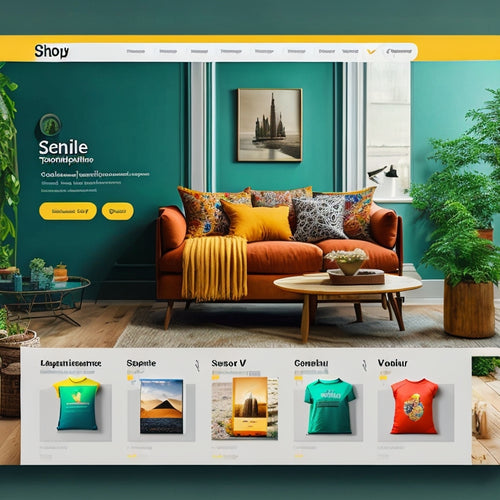
Unlock Success: Masterful E-commerce Platform Selection
Share
Selecting a masterful e-commerce platform is essential for online business success. It directly impacts scalability, customization, security, and customer experience, ultimately driving growth and profitability. Key considerations include scalability for future growth, customization options for differentiation, security features for trust-building, and robust customer support for loyalty. A platform that prioritizes mobile responsiveness, loading speed, and user-friendly interfaces is vital for a seamless shopping experience. By carefully evaluating these factors, businesses can harness their e-commerce potential and create a thriving online store. Now, explore the essential elements of a successful e-commerce platform to maximize your online success.
Key Takeaways
• Scalability is crucial when selecting an e-commerce platform to accommodate future growth and changing demands.
• Customization options enable tailoring the platform to meet specific business needs and differentiate from competitors.
• Robust security features, such as SSL certificates and encryption, protect customer data and build trust.
• Integration with multiple payment gateways improves customer experience and conversion rates.
• Responsive customer support and comprehensive documentation ensure a seamless and profitable online store operation.
Key Considerations for Success
Three critical components underpin the foundation of a successful e-commerce platform: scalability, customization, and security, which collectively form the cornerstone of a thriving online store.
Customization options are essential, enabling businesses to tailor their platform to meet specific needs and differentiate themselves from competitors.
Security features, such as SSL certificates and encryption, protect sensitive customer data and instill trust in online transactions.
Moreover, payment gateways and customer support are crucial considerations, as they directly impact the customer experience and conversion rates. A platform that integrates seamlessly with various payment gateways and offers robust customer support can greatly enhance the overall shopping experience, leading to increased customer loyalty and retention.
Unlocking E-commerce Potential
Numerous e-commerce businesses struggle to maximize their full potential, hindered by inadequate platforms that fail to provide the necessary tools and features to drive growth and profitability.
To unleash e-commerce potential, it is essential to select a platform that offers scalability for future growth, allowing businesses to adapt to changing demands.
Customization options are also essential, enabling businesses to tailor their online store to meet specific needs.
Additionally, a platform's security features and customer support capabilities play a significant role in building trust with customers and ensuring seamless transactions.
Building a Thriving Online Store
To build a thriving online store, e-commerce businesses must focus on creating a seamless user experience by prioritizing mobile responsiveness, loading speed optimization, and a user-friendly interface. This foundation enables businesses to enhance customer retention by providing a convenient and enjoyable shopping experience.
A well-designed online store also reinforces brand identity, establishing a strong visual presence that resonates with customers. By incorporating inventory management tools and marketing features, businesses can streamline operations and drive sales.
A strategic approach to building an online store sets the stage for long-term success, allowing businesses to adapt to changing market conditions and stay ahead of the competition.
Frequently Asked Questions
How Do I Ensure Seamless Integration With Third-Party Logistics Providers?
To guarantee seamless integration with third-party logistics providers, implement API key management to securely connect and authenticate with shipping carriers, and select a platform offering diverse shipping carrier options for flexible and scalable logistics management.
Can I Use My Existing Branding and Design on the New Platform?
As a master weaver, you've carefully crafted your brand's tapestry; now, guarantee brand consistency by transplanting your visual identity to the new platform, preserving the essence of your brand's narrative, and weaving a seamless customer experience.
What Are the Platform's Policies on Data Ownership and Portability?
When evaluating an e-commerce platform, scrutinize its data ownership and portability policies to guarantee data sovereignty, enabling customer empowerment through seamless data transfer and control, thereby fostering trust and flexibility in the online shopping experience.
How Does the Platform Handle Product Variations and Complex Pricing?
Did you know that 71% of customers expect personalized product offerings? When it comes to handling product variations and complex pricing, look for platforms that support Bundle Discounts and Tiered Pricing, enabling flexible pricing structures and tailored customer experiences.
Are There Any Limitations on the Number of Products or Categories?
When evaluating e-commerce platforms, investigate product limits and category caps to confirm they align with your business needs. Assess if there are restrictions on product listings, category hierarchies, or nested categories to avoid future scalability issues.
Related Posts
-
Creating an Engaging Shopping Experience
In the age of digital shopping, businesses are constantly seeking innovative ways to engage customers and elevate th...
-
Ultimate Guide To Creator Platforms For High-Performing Ugc Videos
Welcome to the ultimate guide to creator platforms for high-performing UGC videos. In this comprehensive article, we ...
-

Do You Need a SEO App for Shopify
This article examines the necessity of utilizing a SEO app for Shopify. By considering the benefits of incorporating...
